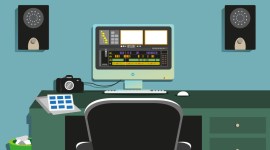Wisdom for Editors from Leading Post-Production Professionals
In this post, post-production pros lend their editing advice gained from years of personal experience.
Great direction for those starting out in the industry or for industry vets looking to improve their craft.
I often get asked advice from those starting out or looking to break into the industry…
What should I study in school?
How can I become more employable?
What makes an editor successful?
After years of passing on my own anecdotal recommendations, I recently reached out to some of the industry’s leading editors and post-production educators to hear their response when presented with the question “What advice do you have for new or aspiring editors.” Although the responses came from industry leaders spread out across the world, through analogous experiences, much of the wisdom and suggestions were strikingly similar.
**Thanks to everyone that contributed to this post. Click the names and avatars below to follow them on Twitter!**
HARD WORK & CLIENT RELATIONSHIPS
Often it seems aspiring editors become micro-focused on the “tech” that goes into this work. It should not be overlooked that editing is a collaborative human-based effort. Whether between editor and production crew or editor and a client, a big aspect of the post-production process involves working with others to execute a creative vision. Knowing the tech is essential, but equally important is the ability to work in a collaborative environment. Much of the input that we received from pro editors echoed this sentiment, focusing on the importance of finding success in collaboration.
| @kyl33t ALWAYS be direct and honest. no mind games, no building resentment. Just communicate, collaborate, and compromise. There is a fine line between willingness/strong work ethic and being taken advantage of. | |
| @originalsmiley Learn patience. | |
| @Philiphodgetts If you don’t understand: ask! Don’t assume anything – confirm you’ve understood correctly. | |
| @ericosterberg Be someone people can sit in a room with for 10 or 15 hours at a time and you’ll get many freelance calls. | |
| @conigs Be friendly. Talk to the producers/directors/clients in your room. Make them want to work with you. | |
| @rhedpixel If you have a bad feeling, say something. | |
| @Dr0id Give. | |
| @ThePageBoy Learn to find new tactful ways of explaining why an idea is “stupid”. |
ORGANIZATION
On this blog, we’ve often said “organization is the key to efficient editing” and much of what we heard from industry pros backed this up. With digital production we’re seeing larger amounts of video shot and culled together for projects. This increase in data means an even greater need for smart organization practices. Spending the time on the front end to organize media and generate metadata means greater timesavings during the cutting process.
| @davemehrman Stay organized. Knowing where files are saves time and headaches. Keep your files organized. When you know where things are, you can focus on the story. |
|
| @little_lucylu Take time to name things correctly. Untitled sequences will be the bain of your life otherwise. | |
| @ukjoncollins Good organisation is 90% of editing. |
|
| @philiphodgetts Do great log notes and know your basic tech (or go look it up). |
|
| @ronsussman It’s all about attention to details. Organization is key. Look for the unexpected moments. |
|
| @comebackshane Take the time to review your footage, and get organized. Editing is faster when you know what you have, and where it is. |
STORYTELLING & GOOD EDITING PRACTICES
Good storytelling comes from experience and creative thinking, but it also comes from self-awareness. Some of the best editors are those that can take a step back from their position in the process and instead look at the video as the intended viewer would. Editors tend to develop a relationship with the footage as they work it, becoming attached to shots or sequences. Instead, strip away any context you may have developed for the footage during the production/post process. Examine it strictly for its storytelling potential. Does it make the scene stronger or weaker?
Along with tips for good storytelling some of the feedback we got was how to improve the actual editing process. Check out some of these tips and good editing practices…
| @mjeppsen “Learn to kill your babies.” The shot/scene/style you love may not best serve the story. |
|
| @macgarp Make a decision and own it. | |
| @camkingvidguy Timing, pacing, story. Study storytelling. Software doesn’t matter if you can tell what makes a great story. | |
| @dvbgregory Have passion for your edits and see your edits as your shooting. | |
| @ronsussman It may indeed be the best take but that doesn’t mean it will work in context. This is why I don’t pull selects. | |
| @matthewcelia Editing is really only about the in and the out points and the order you put it in. Everything else is extra. | |
| @Cineblur The power of a cut. Don’t overuse the dissolve. It gets old and boring. | |
| @andymees The best transition is a simple cut … dissolves are for editors that can’t cut. | |
| @britmic Cut on an action, no matter how small | |
| @little_lucylu Don’t call it final until the bill has been paid. Version numbers are your friend! | |
| @Chris8Video Learn keyboard shortcuts and stop fumbling w/ the mouse. | |
| @EditorBron I put all footage from a bin on a timeline. I don’t only log it. Scrolling through lets you quickly pick out which shots will work. | |
| @twilsbach Producer/network notes. Address the underlying concern, not just the specific fix. Also, learn your keyboard shortcuts. | |
| @DRGlenngreenRX Don’t be afraid to save separate versions w/progressively bolder choices & extreme reshuffling of timeline |
TOOLS & GEAR
Being adept with a wide variety of hardware and software tools makes you more employable and will likely lead to the creation of a stronger product. Much of the advice that we heard from industry pros supported the view that although it’s not the software that equals success, having a wide knowledge base of different tools can lead to greater success as an editor.
| @IEBAcom Don’t learn how to use only one tool. | |
| @1987velle Use what’s right for YOU. Not because ever one else uses it. Take reviews of gear/software with a pinch of salt. Test out yourself. | |
| @lafcpug Don’t listen to the pundits about what tool is best. Seek your own truth. And learn all the tools. | |
| @michaschmidt It’s not the app you are using that counts. It’s the editor and the ideas that matters. | |
| @rhedpixel 90% of technical problems are cable problems. | |
| @oflanada Be YOUR best with YOUR gear. When you reach your full potential with gear you have, you’ll have the opportunity to get better gear and start the process over. | |
| @ParadiddlePix Non-linear software is a tool for you to finely craft a story. Every project is a story. Every edit decision must have motivation. |
SELF IMPROVEMENT
Finally, we heard from many pros that stressed the importance of continuing education and self-improvement. This is an industry that is continually evolving with new technologies, new challenges and new modes of business. Staying informed of new advances will lead to greater opportunities and success.
| @MulhernMedia Practice! Look around for inspiration. Try new things and show off your talent to as many people as possible. | |
| @oflanada Keep learning. Eat, breath, and live the craft. Soak up everything you can from pros and others willing to help. | |
| @DylanReeve Try to understand underlying principles to your software and process. | |
| @editblog You’re never done learning…either the craft or the technical side. You can learn from anyone, even those under the editor. | |
| @LB_Cuts Take every job you get. Especially the ones you think are too tough for you. You’ll learn quickly & realize how much you can achieve. | |
| @ale_zorio Be strong and never give up. |





